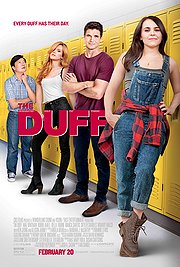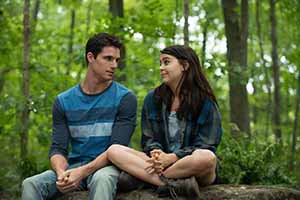Cliff Bugle has joined The Dagger as our newest film critic:
Cliff Bugle has been writing about movies since his early days at college, but his love for them goes as far back as his earliest memories. At NYU he earned a BA in Cinema Studies, followed by a MS in Writing from Towson University. What most fascinates him about movies is that they reflect and shape cultures more tangibly than any other artistic medium. Discovering how they do this is what compels him to write about them.
“The DUFF” is a perfect example of how the potential of a half-baked story can go to waste. From a studio’s perspective you have something very marketable here: a catchy acronym (we do love acronyms that create new words), a quirky schoolgirl destined to come out of her shell, and a social environment that’s recognizable to the vast majority of moviegoers. But despite the many boxes checked on the list of things needed for a decent teen movie, “The DUFF” is ultimately way too thoughtless and offensive to succeed.
Bianca (Mae Whitman) is a content high school senior whose world is shattered when she learns the student body refers to her as ‘The DUFF’ (Designated Ugly Fat Friend) to her prettier, more popular friends (Skyler Samuels & Bianca Santos). With her universe turned upside down, she ignores words of wisdom from her favorite teacher (Ken Jeong) and enlists Wesley (Robbie Amell), the popular boy next door, to help her shed the label. (Synopsis by CBS Films)
How is it offensive, you ask? Well, it’s certainly not for the reasons that usually incite audiences. There are no hints of nudity to speak of, hardly any adult language, and the topic of sex is barely even a peripheral concern. Rather, the movie is offensive for how it handles the very topical and very serious issues of cyberbullying and young girls’ difficulties living in an image-obsessed culture.
Bianca (Whitman) is mortified when a hidden camera video depicting her royally embarrassing herself is spread virally around school. But what worsens the already embarrassing footage are the various edits that viciously criticize her body. While Bianca is predictably humiliated by the incident, her initial response is an expression of shame. She essentially blames herself for being worthy of ridicule. I’m sorry, but exactly how is the victim blaming herself a positive example for anyone? Have we not made progress since Sandra Dee decided to dress like a streetwalker to win the affections of Danny Zuko?
And then there’s the offensiveness of the term DUFF itself. Bianca, while maybe not a Victoria’s Secret model, is hardly fat or ugly. The offered justification for the term is that it’s one-size-fits-all, pertaining to any persons considered comparatively less attractive than their friends. But exactly how does adding relativity to the concept help? All that does is further promote unfair comparisons and wrongly equate beauty with social value–or worse, with self-worth. By the end of the film the term becomes re-appropriated so as to describe anyone and everyone who occasionally feels inferior for any reason, supposedly robbing it of its power to offend.
This new definition is arrived at (illogically) thanks to the film’s flawed narrative structure. Simply enough, it is transparently based on the five stages of grief–denial, anger, bargaining, depression, and acceptance–which are meant to be related to Bianca’s efforts to come to terms with her label as a DUFF. Not only is it offensive to suggest that someone need go through the stages of grief when accused of failing to meet social standards of beauty, but it is especially so when that person showed no evidence of subscribing to those standards beforehand. Her dramatic reaction to realizing her social status undermines the “Juno”-esque self-assuredness she exhibits during the film’s exposition. And this is beside the larger point that the stages of grief have no logical relation to the story’s concluding theme of self-empowerment. Attention Filmmakers: Acceptance of an offensive moniker is not the same as “owning it.” Just ask any black person, Jew, Italian, Asian, Muslim…you get the point.
You may argue that some credit should be given for the fact that the film bothers to recognize the issues of cyberbullying and poor body image at all. However, a movie supposedly daring enough to recognize these issues should also be mature and clever enough to address them with authenticity and finesse. Unfortunately, “The DUFF” fails to do any of that. It offers no healthy solutions to dealing with cyberbullying, its plot structure makes no sense, its protagonist is a poor role model for those with self-image issues, and its theme sends the wrong message. It is a comprehensively under-thought story with only enough humor and charm to make its 101 minute running time fairly painless for those parents or boyfriends asked to endure it. And to those girls eager to see it, you’re better off re-watching less problematic high school romps like “Mean Girls,” “Easy ‘A’” or “10 Things I Hate About You. “
“See It/ Rent It/ Skip It”: Rent it.
TWO STARS out of four.
Directed by Ari Sandel
Rated PG-13 for crude and sexual material throughout, some language and teen partying.
Runtime: 1 hours and 41 minutes






Your fucking report is wrong! If you are going to diss a fucking great movie don’t make it sound worse than it is ok?? You fucking exaggerate everything to suit your point of view! You fucking losers should get a fucking life… I mean what do you do all day? Watch movies and write things about them?? Seriously I did that when I was like 8! You fucking idiots! Fucking hell if you are going to talk about a movie don’t exaggerate ok?? The media already do that enough! If you take our advice (our being me and my friends) you should either get a fucking life and shut this fucking shit site down or talk about the movies without exaggeration! Get a fucking life you fucking cunts!
Troll? Who really needs a life? The person who anonymously uses vulgar and profane language on some random internet article?
Come on little boy, I’ll give you the address of my office so you can discuss your displeasure in person with me, but I doubt you will come, like all other pip-squeek big internet talkers.
By the way, I make $678,000 a year. Why is that important? Not sure, thought I’d rub that in your face when you serve me fries.
A degrew in Cinema Studies? Is that for real? LOL
“Cinema Studies”: watch movies and write sample reviews that nobody cares about. Attempt to make it appeal to a particular audience, but fail miserably because while I dream to be famous like Siskel and Ebert, I will continue to use big words and writw for a small town web-based “news” paper.
With the emotional writing in this piece, my guess was that the author (a) was a duff, or (b) married one.
As for the comment above – wow! Funny! LOL
Yes, there are some typos. For give me oh Master of Science in Writing – which, coincidentally, nobody does anymore.
Why evaluate a movie likes it’s early Russian cinema advancing the social milieu . Was it entertaining? If so, then great. The only thing worse than a socially significant movie is a socially significant anything. Geez! Can we just get a break now and then by going to a movie?